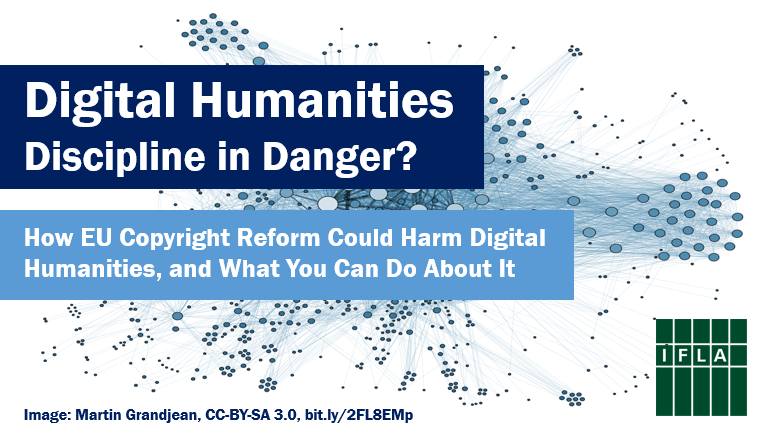
The Digital Humanities – a highly promising emerging field academic discipline in which libraries are heavily invested – risks being seriously damaged by a proposed amendment to the EU draft Directive on Copyright in the Digital Single Market. This short-sighted and poorly thought-through measure needs to be rejected in order to favour research which offers important new perspectives in support of better policy making.
The humanities – history, politics, geography, literary studies and more – play a vital role in understanding how our societies work. In doing so, they inform our attitudes, our responses, and our choices.
This is also true of the work of governments and other decision-makers, who need the best available evidence and insights to define the right policy.
While these disciplines have traditionally been seen as some way behind the ‘hard’ sciences in their uptake of digital tools, this is less and less the case. Digital humanities – the application of digital tools to humanities research – has not only opened up new possibilities for analysis, but are also driving convergence, allowing for more complete and holistic research than previously. With centres of excellence emerging in universities all over Europe, this is a key area of growth in research.
This blog sets out the issues, and sets out some actions that you can take.
Doing Humanities Digitally
Digital Humanities work by using methods such as text and data mining to analyse large volumes of digital – or digitised – works in order to detect trends and phenomena. It is helping to rectify the long-standing marginalisation of women and other vulnerable groups in the historical record, and is helping us to understand the power of political currents and discourses, support social histories, and offer new insights on the past.
Importantly, and in line with the priorities of many research-supporting organisations, it is interdisciplinary, bringing together teams of experts in order to develop well-rounded projects which take account of all perspectives. For policy and decision-makers, who need to be able to draw on a broad evidence-based, this is a welcome step.
Libraries have been active in the field, rapidly understanding the potential to make new uses of collections, and using their expertise to support interdisciplinary working.
You Can Have Your Cake But You Can’t Eat It
Digital humanities scholars, as implied above, rely on the possibility to carry out analysis of digital (or digitised) texts.
When dealing with works which are not yet in the public domain (which is only safe to say for works dating from before 1880), two exceptions to copyright come into play, at least in the European context:
- the right to take copies of works (i.e. digitising analogue works in order to ensure their ongoing accessibility), and
- the right to carry out analysis on them for research purposes (covered by the new proposed exception in the Digital Single Market Directive for text and data mining ).
However, an amendment proposed by the European Parliament (article 6) would make this impossible, by forcing librarians and researchers to choose between either digitising or copying works, or actually using them.
In effect, that they can either have a cake or eat it – but not both. The proposal would mean an organisation will have to choose whether to preserve an in copyright work, data mine it or use it in distance learning. Once one of these activities has been performed, you cannot undertake any of the other activities outlined in the proposed new copyright directive.
Such a choice is absurd, and would put an end to much of the work that digital humanities are doing today. It would clearly put Europe at a major disadvantage compared to other jurisdictions where more sensible laws are in place.
For European policy-makers, it would also cut off a highly promising source of insights for better policy-making, as well as fairer and more inclusive societies.
In the interests of Europe’s researchers, policy makers and citizens, it is vital to reject this non-sensical amendment.
What Can You Do?
European Union Member States and Members of the European Parliament are currently debating this amendment. You can help underline the need to defend the digital humanities by writing to your national copyright or intellectual property office as soon as possible. We are glad to be working with LIBER on this issue. E-mail us if you want a template you can use: stephen.wyber[at]ifla.org.
Pingback: The End of a Discipline? EU Copyright Directive Endangers Digital Humanities – Veille patrimoniale
Please send me the template to sing it.
Your link doesn’t work.